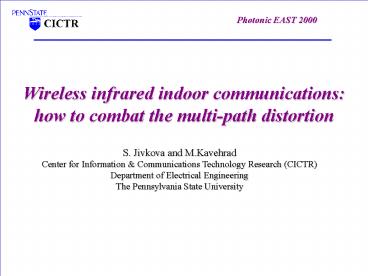Wireless infrared indoor communications: - PowerPoint PPT Presentation
1 / 19
Title:
Wireless infrared indoor communications:
Description:
hologram. two spherical waves, curved substrate (spherical ... Angular and spectral selectivity of a reflection hologram. Multi-spot diffusing configuration ... – PowerPoint PPT presentation
Number of Views:42
Avg rating:3.0/5.0
Title: Wireless infrared indoor communications:
1
Photonic EAST 2000
Wireless infrared indoor communications how to
combat the multi-path distortion
S. Jivkova and M.Kavehrad Center for Information
Communications Technology Research
(CICTR) Department of Electrical Engineering The
Pennsylvania State University
2
Photonic East 2000
Outline
- Multi-Spot Diffusing Configuration (MSDC)
- characteristic features
- Multi-path distortion
- Receiver geometrical configuration
- Channel parameters
- Novel receiver optical front-end design
- Conclusions
3
- Characteristic features
- One-to-many and many-to-one communications
- Lack of alignment requirement
- Roaming possible
- Can be virtually free from multipath induced
temporal distortion - Relatively large cell size
- Tolerance to shadowing and blockage
Quasi non-directed non-LOS configuration
4
Multi-spot diffusing configuration
Multipath distortion
5
Multi-spot diffusing configuration
FOV1
FOV2
At least one diffusing spot lies within each
branch field-of-view
At most one diffusing spot lies within each
branch field-of-view
6
Multi-spot diffusing configuration
Circle areas on the ceiling covered by the
central receiver branch for a receiver position
(0.3m, 05m) measured from the room corner
Room size 6m x 6m x 3m Reflectivity of room
surfaces 0.7 (walls and ceiling),
0.3 (floor) Number of reflections considered
3 Transmitter position center of the room,
0.9m above the floor
7
Multi-spot diffusing configuration Channel
characteristics
FOV1 (two diffusing spots within receiver branch
FOV)
FOV2 (one diffusing spot within receiver branch
FOV)
8
Multi-spot diffusing configuration
DD
DS
Field-of-view of a 7-branch composite receiver
FOV1
central
Number of spots covered by each branch - At
least one
FOV2
central side
- At most one
9
Multi-spot diffusing configuration Receiver
optical subsystem
- Major factors in receiver optical subsystem
design - Signal gain
- Ambient light rejection
- Physical weight, size and cost
10
Multi-spot diffusing configuration Receiver
optical subsystem
Recording of Reflection Holograms
two plane waves, plane substrate (plane
holographic mirror)
two spherical waves, curved substrate (spherical
holographic mirror)
two spherical waves, plane substrate (spherical
holographic mirror)
11
Multi-spot diffusing configuration Receiver
optical subsystem
Holographic curved mirror as a receiver optical
front-end
12
Multi-spot diffusing configuration Receiver
optical subsystem
13
Multi-spot diffusing configuration Receiver
optical subsystem
Angular and spectral selectivity of a reflection
hologram
q10, q2p, l850nm, n1.5, Dn0.01, d60mm
14
Multi-spot diffusing configuration Receiver
optical subsystem
HSM
HPM
15
Multi-spot diffusing configuration Receiver
optical subsystem
HSM
HPM
16
Diffuse configuration Channel characteristics
FOV70deg
FOV10deg
17
Diffuse configurationChannel characteristics
Room size 8m x 8m x 4m Reflectivity of room
surfaces 0.7 Number of reflections considered
5 Transmitter position center of the room, 1m
above the floor
Lomba, Valadas and Duarte, 6th IEEE Intl. Symp.
On Personal, Indoor and Mobile Radio
Communications, Sept. 27-29, 1995, Toronto,
Canada, Proc., pp.321-325
18
Photonic East 2000
Comparison between Pure-Diffuse and Multi-Spot
Diffuse (MIMO) in terms of 3-dB Optical Channel
Bandwidth for a Sample Receiver Position 3.7m
away from Transmitter
19
Photonic East 2000
Conclusions
- Major factors causing channel distortion
- - Higher order reflections
- - Number of diffusing spots
- - Diffusing spot size
- Virtually ideal channel conditions
- - FOV1 (3dB lt 200MHz)
- - FOV2 (3dB gt 2GHz)
- Holographic curved mirror as a receiver optical
front-end - - Multi-functionality
- - Insignificant physical weight































